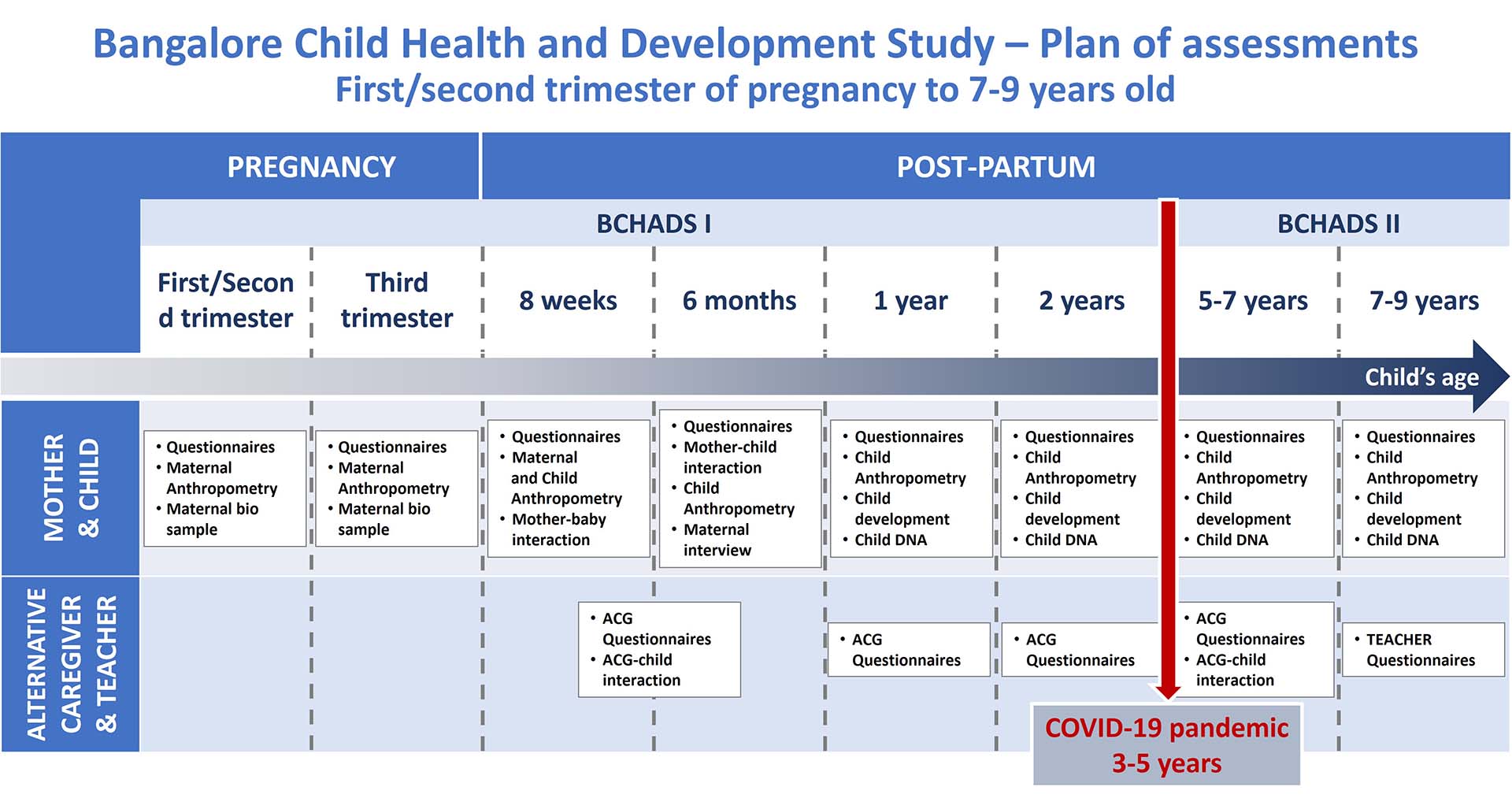The Bangalore Child Health and Development Study (BCHADS)
The Bangalore Child Health and Development Study (BCHADS) aims to identify early social, emotional and biological risks and processes involved in the development of child mental health problems.
The Bangalore Child Health and Development Study (BCHADS) started in April 2016 as a postnatal continuation of the Prospective Assessment of Maternal Mental Health study (PRAMM) which was previously funded by the Indian Council of Medical Research in urban Bangalore, India. The BCHAD study is linked to the UK Wirral Child Health and Development Study (WCHADS) with parallel timing of assessments and measurement. BCHADS was at first jointly funded by the Medical Research Council (UK) and the Indian Council of Medical Research (India) and now continues to be funded by the MRC Global Challenge Research Fund. This is the first longitudinal study starting in pregnancy with a primary focus on maternal and child mental health.
We aim to identify early social, emotional and biological risks and processes involved in the development of childhood conduct and emotional problems. The studies are designed with common measurement in the UK (WCHADS) and India (BCHADS) so we can test whether certain risk and protective factors contribute to the development of child mental health problems in both settings. We also use some distinctive measures that may be relevant in the South Asian setting only.
Being able to conduct a study in India is very important for us because most of the longitudinal research on child development has been carried out in Western countries and we don’t know yet how applicable the results of those studies are to the South Asian context.
To reach our aim, we are gathering different types of data through the use of a variety of tools including:
- quantitative data (questionnaire, interview, observational assessments, cognitive and developmental assessments)
- audio-visual data (mother-infant and caregiver-infant interactions, cognitive testing)
- digital audio recordings of adult interviews
- physical growth parameters
- genetic material (DNA) gathered for genetic and epigenetic analysis
- Immune function parameters
We recruited 909 pregnant women aged 18 years and above during pregnancy from community antenatal clinics in three local Bangalore maternity units, between August, 2014 and November, 2016. We are currently funded to follow the children up to 7 years of age, though due to COVID-19 some of the children are older at the final assessment time-point.
During COVID-19 face to face assessments planned at age 5 had to be delayed and we conducted three additional telephonic follow-up phases to assess family functioning, child mental health and COVID-19 related impacts (highlighted in light blue colour on Figure 1).

The study is led jointly by Professor Helen Sharp in University of Liverpool (Perinatal and Child and Adolescent Clinical Psychology) and Professor Prabha Chandra (Perinatal Psychiatry) from the National Institute of Mental Health and Neuro Sciences (NIMHANS) in Bangalore, India. We have a multidisciplinary team of researchers in the UK and these include Professor Andrew Pickles (Biostatistics - King's College London), Professor Jonathan Hill (Child Psychiatry - Manchester MEtropolitan University) and Professor Atif Rahman (Child Psychiatry - University of Liverpool) and in NIMHANS we have Professor Shoba Srinath (Child Psychiatry), Prof Geetha Desai (Perinatal Psychiatry), Prof John Kommu Vijaysagar (Child Psychiatry), Dr. Thomas Kishore (Clinical Psychology), Professor Thennarasu (Biostatistics) and Professor Venkatasubramanian (Psychiatry and Neuroscience).
We have a large team of researchers based in the field in India and a small team in the UK who work together.
Thank you!
We would like to thank all the families that have agreed to take part in the Bangalore and Wirral parts of the study and who have given their time and energy to help us. We hope that we will be able to share our findings soon and that the study results will improve our understanding of the developmental pathways to child mental health problems increasing the chances of planning effective interventions to help families in future.